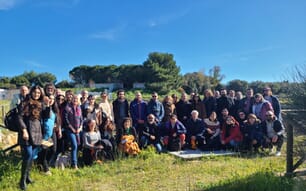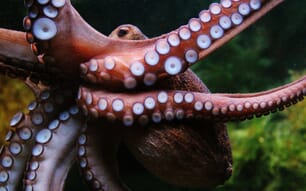
Campaigners are calling for seafood company Nueva Pescanova to scrap plans to build Spain's first octopus farm as new documents reveal that it had failed to consider the significant threats the farm would pose to wildlife, the environment and public health, in addition to animal cruelty concerns.
Coming from the animal rights NGOs Compassion in World Farming, Eurogroup for Animals and AnimaNaturalis, the calls urge the seafood company to immediately halt the progression of their plans for the Canary Islands octopus farm under the claims that the plans directly contradict the company’s own corporate sustainability claims.
According to Nueva Pescanova, the company is committed to “maintaining biodiversity,” “protecting the ecosystem,” and “promoting the circular economy,” however the environmental report submitted by the seafood company for the proposed farm was rejected by the Canary Islands government over concerns of negative impacts to the environment.
Among the concerns is that the farm could threaten dolphins and turtles near the site, and its discharges could add to local water pollution and CO2 emissions. The probability of these impacts was considered to be “significantly high” by the Canary Islands Government.
Additionally, it is feared that the farm may impact the neighbouring marine protected area, including protected cetaceans, pose a risk to public health through low quality inputs, and cause marine pollution and contamination concerns which may threaten a protected species of algae.
Maria Angeles López Lax, a spokesperson for the legal experts who examined the report, said: “Nueva Pescanova’s environmental report was inadequate, lacking basic information to allow the Government to assess the impact of the farm on the environment and public health. It’s up to the company to prove that the farm would not impact on protected species or risk public health before permission can be granted, yet the company has failed to address even the most basic of these concerns,” in a press release.
In addition to environmental concerns, Nueva Pescanova’s plans for the octopus farm have sparked a heated response from the scientific and animal rights communities. Claims from these sectors state that octopus are unique, highly intelligent, naturally solitary creatures who are not suited to the overcrowded conditions that are typical of factory farms. Confining the animals in small spaces together can lead to aggression, distress, and cannibalism.
“It is unjustifiable to introduce this new type of factory farming, as climate scientists warn of the urgent need to change our food systems and evolve our diets to become more sustainable. We deserve better than continued environmental devastation to fill corporate pockets, and these incredible animals deserve better than lives diminished to confinement and suffering,” said Keri Tietge, aquatic animals policy officer, Eurogroup for Animals.




